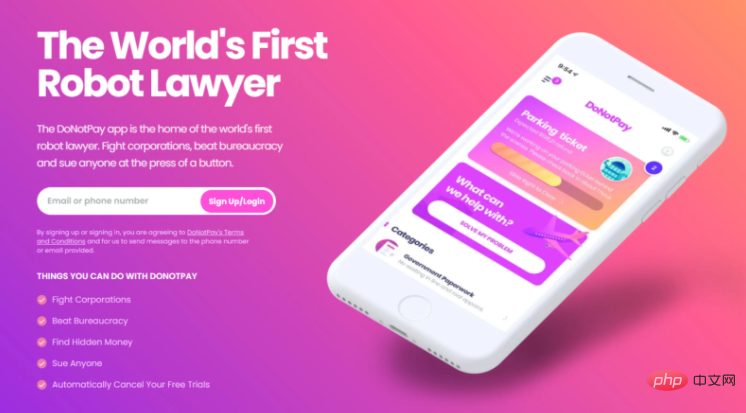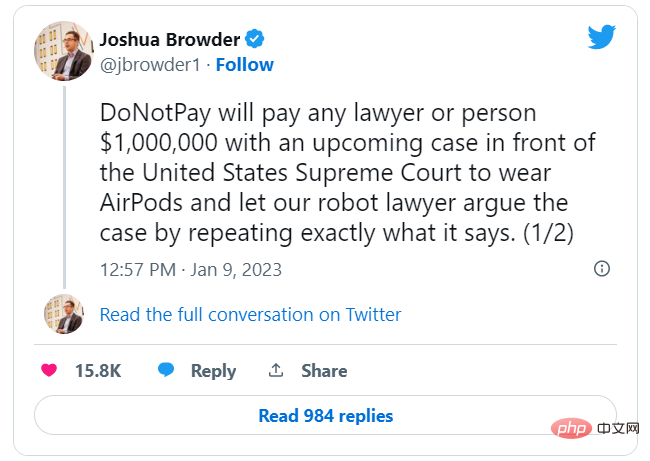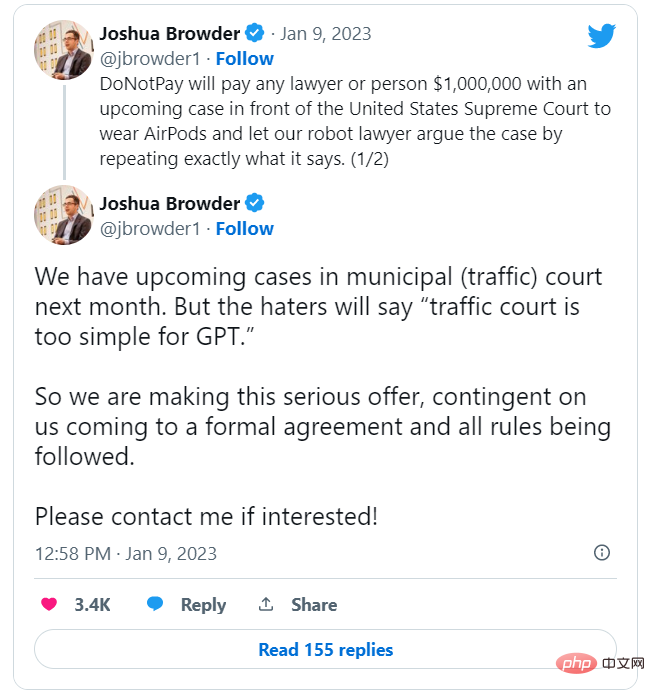
Big Data Digest Produced
According to the British media "New Scientist", AI lawyers will appear in court for the first time.
The AI lawyer belongs to a company called DoNotPay. This company calls its product "the world's first robot lawyer" and specializes in using AI to litigate lawsuits.
This time they take over, they plan to take over two speeding ticket cases in court next month, and the AI "lawyers" will run on smartphones through DoNotPay's app, listening to the court arguments in real time, through headphones Tell the defendant what to say.
In other words, the defendant is only responsible for repeating what the AI said in the headset to defend himself.
DoNotPay CEO and founder Joshua Browder said this will be the first time artificial intelligence is used in a court of law.
DoNotPay was founded in 2015. In its early days, it was an automated customer service robot that helped people appeal parking tickets or request refunds from airlines. Now it is more like a professional legal service chatbot, led by a British-American Founded by entrepreneur Joshua Browder.
Billed as a “robo-lawyer,” DoNotPay is a downloadable mobile app that uses artificial intelligence to provide legal services, with a three-month subscription fee of $36. Currently available in the UK and US (all 50 states).

Speaking of chatbots, readers may think of the recently popular ChatGPT. In fact, like ChatGPT, DoNotPay is also developed based on OpenAI’s GPT-3 API. However, In order to make the artificial intelligence legal, DoNotPay spent a long time training it to understand a large amount of case law.
DoNotPay’s AI applications now cover a wider range of topics, including immigration law. The company claims it has intervened in approximately 3 million cases in the United States and the United Kingdom.
Also, the AI must be trained to stick to factual statements and not make them up in order to win a case. Browder said: "We are trying to minimize legal liability... If it actually distorts the truth and is too manipulative, that's not good."
The phone's audio tool has also been It has been adjusted so that it will not automatically respond to statements every time. “Sometimes silence is the best answer,” Browder said. Browder said his goal is that the software will eventually replace some attorneys. "It's all a matter of language, and that's where attorneys charge hundreds or thousands of dollars an hour... There will still be a lot of good lawyers defending before the European Court of Human Rights (European Court of Human Rights), but a lot of them charge too much and I think they will definitely be replaced and they should be replaced."
100 Bounty Wan is looking for lawyers willing to "take the plunge"
Any lawyer who lets DoNotPay’s AI lawyer argue the case in court can get $1 million. All the human lawyer has to do is put on AirPods and repeat to the court what DoNotPay’s robot lawyer says.
Browder wrote on Twitter on Sunday night: "In an upcoming case before the U.S. Supreme Court, DoNotPay will pay $1 million to any lawyer or individual who wears AirPods and repeats our Defend based on what the robo-lawyer says."
 Although DoNotPay's robo-lawyer successfully got the case to litigate a parking ticket, Browder hopes the Robots can resolve more difficult cases before the Supreme Court to eliminate hypothetical doubts about their abilities.
Although DoNotPay's robo-lawyer successfully got the case to litigate a parking ticket, Browder hopes the Robots can resolve more difficult cases before the Supreme Court to eliminate hypothetical doubts about their abilities.
"Next month we will hear some cases in the municipal traffic court. But the trolls will say that 'traffic cases' are too easy for GPT."
 #In addition to technical issues, DoNotPay needs to face potential legal issues.
#In addition to technical issues, DoNotPay needs to face potential legal issues.
In most countries, it is illegal to use a smartphone or a computer connected to headphones in a courtroom, but DoNotPay has found a place where this setup is classified as a hearing aid and therefore allowed. Browder said: "Technically, it complies with the rules, but I don't think it complies with the spirit of the rules." Nikos Aletras of the University of Sheffield, UK, commented on this Expressing concern over such incidents, he said that providing real-time audio legal advice in court will remain a technical challenge, and ethical and legal questions remain, such as whether the use of audio legal advice in court is legal.
Neil Brown of the British law firm codeded.Legal also said that the use of recording equipment in British courts would violate the Contempt of Court Act 1981 (Act 1981), and the court may consider this artificial The intelligent system interprets this rule as being violated.
Brown said artificial intelligence may play a beneficial role in the future legal system, but it may help lawyers rather than replace them.
Related reports:
https://www.php.cn/link/00430c0c1fae276c9713ab5f21167882
https ://www.php.cn/link/cf2f3fe19ffba462831d7f037a07fc83
##https://www.php.cn/link/342c472b95d00421be10e9512b532866
The above is the detailed content of AI lawyers will make their first appearance in court to defend two speeding tickets. Can humans litigate lawsuits just by following AI instructions?. For more information, please follow other related articles on the PHP Chinese website!
 Computer is infected and cannot be turned on
Computer is infected and cannot be turned on
 How to prevent the computer from automatically installing software
How to prevent the computer from automatically installing software
 Summary of commonly used computer shortcut keys
Summary of commonly used computer shortcut keys
 Computer freeze screen stuck
Computer freeze screen stuck
 How to measure internet speed on computer
How to measure internet speed on computer
 How to set the computer to automatically connect to WiFi
How to set the computer to automatically connect to WiFi
 Computer 404 error page
Computer 404 error page
 How to set up computer virtual memory
How to set up computer virtual memory




